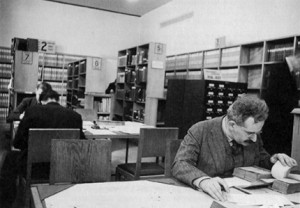Tag Archives: scrapbook
If you’re going to call your book Dead Water, you have to look the part…
It’s author photograph time again. None of your fist-on-chin malarky here. This is me about to pass out from sunstroke during a “research trip” (Inland Revenue please note) to Oman. Anna calls this my “creepy farmer” look.
The barrel-eye
The Eye contains some cursory descriptions of adaptive “spectacles” – but nothing like this.
Oscar Wilde
Life goes faster than Realism.
Tweet-o-Meters in the British Library
Untitled
Comedy
“If the novel dies, as predicted, it will be found drowned in the doldrums of verisimilitude, having forgotten the comedy of history and the value of the burlesque. “
Andrew O’Hagan
APEngine interviews Simon Pummell
Light Forms (HD – 2010)
Against interiority
This is by Walter Benjamin:
“The first storyteller of the Greeks was Herodotus. In the fourteenth chapter of the third book of his Histories there is a story from which much can be learned. It deals with Psammenitus.
“When the Egyptian king Psammenitus had been beaten and captured by the Persian king Cambyses, Cambyses was bent on humbling his prisoner. He gave orders to place Psammenitus on the road along which the Persian triumphal procession was to pass. And he further arranged that the prisoner should see his daughter pass by as a maid going to the well with her pitcher. While all the Egyptians were lamenting and bewailing this spectacle, Psammenitus stood alone, mute and motionless, his eyes fixed on the ground; and when presently he saw his son, who was being taken along in the procession to be executed, he likewise remained unmoved. But when afterwords he recognized one of his servants, an old, impoverished man, in the ranks of the prisoners, he beat his fists against his head and gave all the signs of deepest mourning.
“From this story it may be seen what the nature of true storytelling is. The value of information does not survive the moment in which it was new. It lives only at that moment; it has to surrender to it completely and explain itself to it without losing any time. A story is different. It does not expend itself. It preserves and concentrates its strength and is capable of releasing it even after a long time. Thus Montaigne referred to this Egyptian king and asked himself why he mourned only when he caught sight of his servant. Montaigne answers: “Since he was already overfull of grief, it took only the smallest increase for it to burst through its dams.” Thus Montaigne. But one could also say: The king is not moved by the fate of those of royal blood, for it is his own fate. Or: We are moved by much on the stage that does not move us in real life; to the king, this servant is only an actor. Or: Great grief is pent up and breaks forth only with relaxation. Seeing this servant was the relaxation. Herodotus offers no explanations. His report is the driest. That is why this story from ancient Egypt is still capable after thousands of years of arousing astonishment and thoughtfulness. It resembles the seeds of grain which have lain for centuries in the chambers of the pyramids shut up airtight and have retained their germinative power to this day.”





